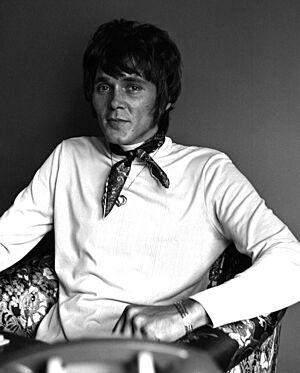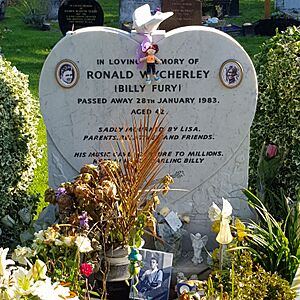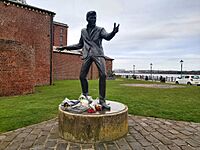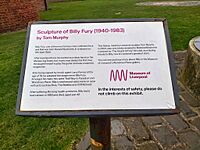Billy Fury facts for kids
Quick facts for kids
Billy Fury
|
|
|---|---|

Fury photographed by Allan Warren in 1968
|
|
| Background information | |
| Birth name | Ronald Wycherley |
| Born | 17 April 1940 Liverpool, England |
| Died | 28 January 1983 (aged 42) London, England |
| Genres |
|
| Occupation(s) | Musician |
| Instruments | Vocals, guitar, piano, drums |
| Years active | 1958–1983 |
| Labels |
|
Ronald Wycherley (born April 17, 1940 – died January 28, 1983) was an English musician. He was much better known by his stage name, Billy Fury. He became a big star in early British rock and roll. Billy Fury had an amazing 24 hit songs in the 1960s, just like the Beatles. His songs stayed on the UK music charts for a total of 332 weeks! Some of his most famous songs include "Wondrous Place", "Halfway to Paradise", and "Jealousy". Billy Fury also acted in movies. He played rock musicians in films like Play It Cool (1962) and That'll Be the Day (1973).
People said Billy Fury became a huge rock and roll star quickly. He had a good voice and musical talent. He was also known for his energetic stage performances.
Contents
Early Life
Billy Fury was born Ronald Wycherley in Liverpool, England, on April 17, 1940. He started learning piano lessons before he was a teenager. When he was 14, he got his first guitar. In 1955, Ronald led his own music group. At the same time, he worked full-time on a tugboat and later as a docker. He won a talent competition and by 1958, he was writing his own songs.
Music Career
Becoming Billy Fury
Ronald Wycherley went to meet a music manager named Larry Parnes. He hoped Parnes' singer, Marty Wilde, would be interested in his songs. Instead, Parnes surprised everyone by putting young Ronald on stage right away. He was so good that Parnes signed him. Parnes added him to his tour and gave him a new name: "Billy Fury".
Billy Fury's early stage shows were very wild. He was asked to calm them down. A music magazine, NME, even wrote about how much people were talking about his stage moves.
First Hits and Films
In 1959, Billy Fury released his first hit song, "Maybe Tomorrow", with Decca. He also appeared in a TV play and on the show Oh Boy!. In March 1960, his own song "Colette" reached No. 9 in the UK. This was followed by "That's Love" and his first album, The Sound of Fury. A young Joe Brown played guitar on this album.
After more hits, Billy Fury needed a new band. His manager held auditions in Liverpool. The Beatles, who were then called the Silver Beetles, tried out. They were offered the job but had to fire their bassist, Stuart Sutcliffe. John Lennon refused, and the band left. But Lennon did get Billy Fury's autograph!
Billy Fury started singing more mainstream ballads instead of just rock and roll. Songs like "Halfway to Paradise" and "Jealousy" became huge hits in 1961. He told NME he wanted to be seen as a singer, not just a rock singer. He wanted to try different styles as he grew up. Decca Records wanted him to be a teen idol.
The years 1961 to 1963 were Billy Fury's most successful on the charts. In 1962, he starred in his first movie, Play It Cool. This film was similar to movies made by Elvis Presley. The hit song from the movie was "Once Upon a Dream".
His album We Want Billy! (1963) was one of the first live rock albums in the UK. It included his hits and covers of R&B songs.
In 1965, he appeared in the film I've Gotta Horse. His backing group, the Gamblers, were also in the movie. Billy Fury left Decca Records in 1966 and signed with Parlophone.
He had more UK hits like "It's Only Make Believe" and "I Will" (both in 1964), and "In Thoughts of You" (1965). After 1967, Billy Fury's songs stopped appearing on the charts as often. He had heart surgeries in 1972 and 1976, which meant he couldn't tour much. Even though he never had a number one hit, he stayed popular. His song "I Will" became a hit for Dean Martin in the US.
Later Years
In 1973, Billy Fury came out of semi-retirement to act in the film That'll Be the Day. He played a character called 'Stormy Tempest'. The movie starred David Essex and Ringo Starr from the Beatles. It was loosely based on the early days of the Beatles.
In the mid-1970s, Billy Fury toured with Marty Wilde. When he wasn't performing, he worked on protecting wildlife. His health got worse, and he had two open heart surgeries. In 1978, he had financial problems because of unpaid taxes from 1962. He had to give up his song royalties.
A new song, "Be Mine Tonight" (1981), did not make it onto the UK charts. In March 1981, Billy Fury collapsed while working on his farm and almost died. He started touring again later that year. His next two songs, "Love or Money" and "Devil or Angel", also did not become big hits.
In 1981 and 1982, Billy Fury signed with Polydor Records. He recorded a comeback album called The One and Only. This album was released after he passed away. Because of his health, he didn't tour much to promote the new album. His last public performance was on December 4, 1982. A few days before he died, he recorded a TV show called Unforgettable. He sang six of his old hits, but only four were shown on TV.
Personal Life
Billy Fury loved watching birds. He lived with businesswoman Lee Everett Alkin from 1959 to 1967. During this time, he also had a short relationship with actress Amanda Barrie. She was his co-star in I've Gotta Horse. Billy Fury moved from Liverpool to London, just like the Beatles. He lived on the same street as Paul McCartney. There is a special Blue Plaque on his old home to remember him.
Billy Fury married Judith Hall in May 1969. Later, he lived with Lisa Voice from 1971 until his death. They lived in London and sometimes on his farm in Wales.
Death
On January 28, 1983, Billy Fury returned home after a recording session. He collapsed from a heart attack at his home in London. His manager found him unconscious the next morning. He was taken to St Mary's Hospital but passed away later that afternoon. He was 42 years old. When he was a child, he had Rheumatic fever. This illness damaged his heart and was the main cause of his death.
A week after he passed away, a funeral service was held in London. Many people came to remember him, including his family, friends, and other musicians. His body was buried at Mill Hill cemetery in North London. A song released after his death, "Forget Him", became his last song to appear on the charts.
Legacy
In 1999, a TV show about Billy Fury called Halfway to Paradise was shown on the BBC. His song "Wondrous Place" was used in a car advertisement, making it popular again. In 2005, a book about him called Wondrous Face – The Billy Fury Story was published. A documentary film, Billy Fury: His Wondrous Story, was released on DVD in 2008.
On April 19, 2003, a bronze statue of Billy Fury was put up at the National Museum of Liverpool Life. Fans raised money to pay for the statue.
In 2010, a small street in London was named "Billy Fury Way" in his honor. It is near where he used to record music. A large painting of his face was put on a wall there in 2011.
Some of Billy Fury's recordings were not released on CD for a long time. In 2010, they were finally released on a CD called The Complete Parlophone Singles. The money from this CD helps buy equipment for hospital heart units. In 2011, another CD called The Lost Album was released. It was made to sound like an album Billy Fury recorded but never put out.
Billy Fury's backing band from the 1970s, Fury's Tornados, still tour today. They perform in a show called Halfway to Paradise: The Billy Fury Story. Other tribute bands also keep his music alive. The film Play It Cool was released on DVD in 2014.
Discography
- The Sound of Fury (1960)
- Billy Fury (1960)
- Halfway to Paradise (1961)
- Billy (1963)
- The Golden Years (1979), re-released in 1983 as Memories
- The One and Only (1983)
See also
 In Spanish: Billy Fury para niños
In Spanish: Billy Fury para niños
- List of people from Merseyside
- List of Decca Records artists
- List of rockabilly musicians
- List of performers on Top of the Pops




